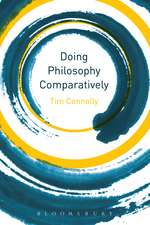The Politics of Nihilism: From the Nineteenth Century to Contemporary Israel: Political Theory and Contemporary Philosophy
Editat de Assistant Professor Nitzan Lebovic, Assistant Professor Roy Ben-Shaien Limba Engleză Paperback – 19 noi 2014
| Toate formatele și edițiile | Preț | Express |
|---|---|---|
| Paperback (1) | 237.75 lei 6-8 săpt. | |
| Bloomsbury Publishing – 19 noi 2014 | 237.75 lei 6-8 săpt. | |
| Hardback (1) | 831.83 lei 6-8 săpt. | |
| Bloomsbury Publishing – 19 noi 2014 | 831.83 lei 6-8 săpt. |
Din seria Political Theory and Contemporary Philosophy
- 14%
 Preț: 192.73 lei
Preț: 192.73 lei - 23%
 Preț: 191.13 lei
Preț: 191.13 lei - 30%
 Preț: 540.80 lei
Preț: 540.80 lei - 13%
 Preț: 239.59 lei
Preț: 239.59 lei -
 Preț: 190.96 lei
Preț: 190.96 lei - 13%
 Preț: 257.50 lei
Preț: 257.50 lei - 22%
 Preț: 256.29 lei
Preț: 256.29 lei - 22%
 Preț: 258.77 lei
Preț: 258.77 lei - 30%
 Preț: 774.20 lei
Preț: 774.20 lei - 23%
 Preț: 178.36 lei
Preț: 178.36 lei -
 Preț: 239.59 lei
Preț: 239.59 lei - 14%
 Preț: 191.13 lei
Preț: 191.13 lei - 13%
 Preț: 257.41 lei
Preț: 257.41 lei - 22%
 Preț: 225.12 lei
Preț: 225.12 lei - 23%
 Preț: 222.84 lei
Preț: 222.84 lei - 21%
 Preț: 217.62 lei
Preț: 217.62 lei - 24%
 Preț: 188.01 lei
Preț: 188.01 lei - 30%
 Preț: 510.34 lei
Preț: 510.34 lei - 30%
 Preț: 511.81 lei
Preț: 511.81 lei
Preț: 237.75 lei
Preț vechi: 273.34 lei
-13% Nou
Puncte Express: 357
Preț estimativ în valută:
45.50€ • 49.41$ • 38.22£
45.50€ • 49.41$ • 38.22£
Carte tipărită la comandă
Livrare economică 22 aprilie-06 mai
Preluare comenzi: 021 569.72.76
Specificații
ISBN-13: 9781623561482
ISBN-10: 1623561485
Pagini: 248
Dimensiuni: 152 x 229 x 30 mm
Greutate: 0.36 kg
Editura: Bloomsbury Publishing
Colecția Bloomsbury Academic
Seria Political Theory and Contemporary Philosophy
Locul publicării:New York, United States
ISBN-10: 1623561485
Pagini: 248
Dimensiuni: 152 x 229 x 30 mm
Greutate: 0.36 kg
Editura: Bloomsbury Publishing
Colecția Bloomsbury Academic
Seria Political Theory and Contemporary Philosophy
Locul publicării:New York, United States
Caracteristici
INTERDISCIPLINARY: In addition to philosophical arch, presents revealing, self-critical view on Israeli politics and culture
Notă biografică
Nitzan Lebovic is the Apter Chair of Holocaust Studies and Ethical Values at Lehigh University (PA). Roy Ben-Shai is a Mellon Post-Doctoral Fellow and Visiting Assistant Professor of Peace, Justice and Human Rights at Haverford College (PA).
Cuprins
Introduction (Roy Ben-Shai and Nitzan Lebovic) Chapter 1 Nihilism as Stasis: A Plea for a New Hermeneutics of Exposure (Nitzan Lebovic) Chapter 2 Less than Nihilism (Luca Di Blasi) Chapter 3 Doing Nothing or Nothing Doing? (Michael Gillespie) Chapter 4 A Concept of Nihilism for the Coming End of the World (Adi Ophir) Chapter 5 Nihilism, Revolt, and the Spectacle (Bülent Diken) Chapter 6 The Epistemology of Nihilism in Otto Weininger's Sex and Character (Bettina Bergo) Chapter 7 In Sickness and in Health: Nietzsche, Améry and the "Moral Difference" (Roy Ben-Shai) Chapter 8 Nihilism and Repetition. Dahlia Ravikovitch's Reiterations as Critique (Liron Mor) Chapter 9 What is a "Manifestly Illegal" Order? Law and Politics after Yoram Kaniuk's Nevelot (Itamar Mann) Chapter 10 To Be at Home: Spaces of Citizenship in the Community Settlements of the Galilee (Fatina Abreek-Zubeidat and Ronen Ben-Arie)BibliographyIndex
Recenzii
This original and challenging volume traces the development of the concept of nihilism from a stunning variety of perspectives and theoretical positions. Combining precision, erudition and intellectual commitment, The Politics of Nihilism makes a convincing case for a view of nihilism as a vital force in a political constellation increasingly hostile to dissonant voices. A lucidly argued and greatly enriching book for anyone interested in the past, present and future of radical political critique.
The Politics of Nihilism is a major contribution to critical studies, and a necessary book for anyone interested in the meaning and history of nihilism and its political relevance in our time.
Can a democratic and liberal politics not be nihilist-and be radically neutral with respect to the choice of values? This book is the result of a seminal work done by a group of Israeli intellectuals and philosophers who are sensible to the problem of equality of citizens in a society that, in as much as it does not accept in principle the polytheism of values to which nihilism leads, is also threatened by an internal revolt that often has wanted to claim equality through the use of the nihilistic weapon of suicide terrorism. Precisely these reasons give birth to the contemporary relevance of the topic in Israel, which is analyzed in these collected essays-with extreme critical balance and secular spirit-as much in its theoretical self-contradictions as in its ethical implications. But apart from the specific problem of the state of Israel as a "Jewish state," which is based upon the acceptance of a religious faith, the question of political nihilism has a general dimension, because it concerns all democratic societies that are continually confronted with the problem of finding a solid rational basis for the laws of their communities.
The Politics of Nihilism is a major contribution to critical studies, and a necessary book for anyone interested in the meaning and history of nihilism and its political relevance in our time.
Can a democratic and liberal politics not be nihilist-and be radically neutral with respect to the choice of values? This book is the result of a seminal work done by a group of Israeli intellectuals and philosophers who are sensible to the problem of equality of citizens in a society that, in as much as it does not accept in principle the polytheism of values to which nihilism leads, is also threatened by an internal revolt that often has wanted to claim equality through the use of the nihilistic weapon of suicide terrorism. Precisely these reasons give birth to the contemporary relevance of the topic in Israel, which is analyzed in these collected essays-with extreme critical balance and secular spirit-as much in its theoretical self-contradictions as in its ethical implications. But apart from the specific problem of the state of Israel as a "Jewish state," which is based upon the acceptance of a religious faith, the question of political nihilism has a general dimension, because it concerns all democratic societies that are continually confronted with the problem of finding a solid rational basis for the laws of their communities.



























